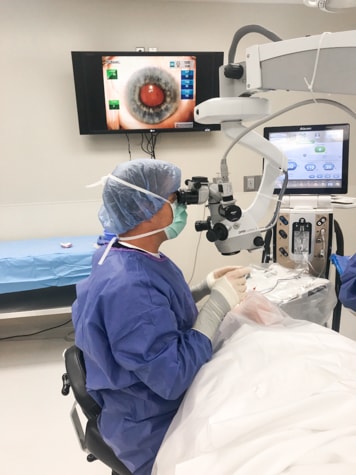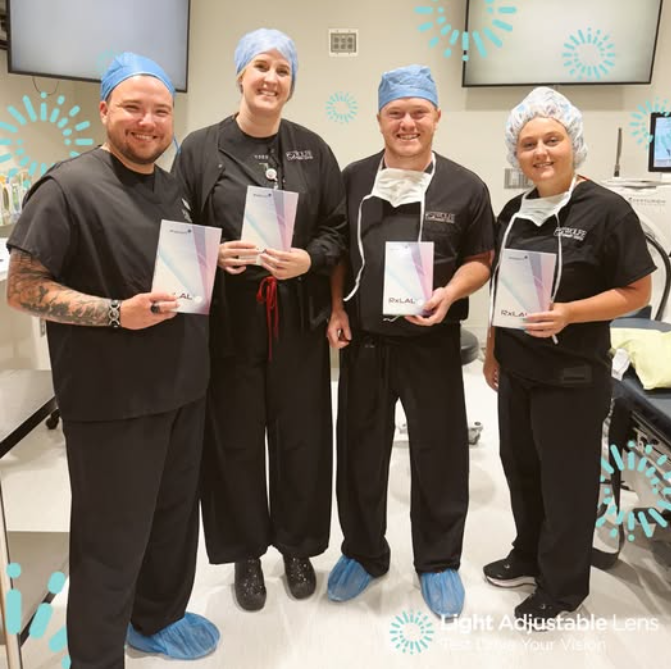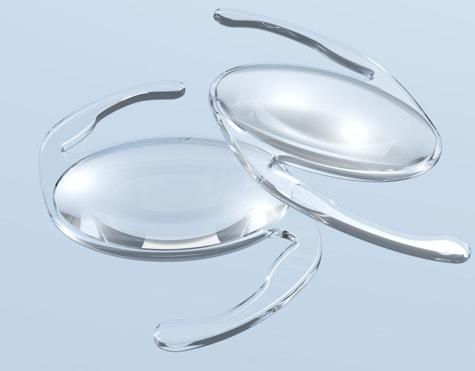FAQs About Cataract Diagnosis, Surgery & Treatment
Do you have questions about cataracts and cataract surgery? The cataract specialists and surgeons at Wolfe Eye Clinic can help answer any questions you have regarding cataract diagnosis and treatment options.
 We are known for providing the highest quality eye care to Iowans across a variety of specialties, including cataracts. Our cataract doctors bring a vast amount of skill and knowledge to the diagnosis and treatment of this medical condition. Motivated by the needs of our patients, we insist on remaining at the forefront of technology. This commitment dates back to the 1930’s when Wolfe Eye Clinic doctors were leaders in developing modern intracapsular surgery that made cataract surgery safer and recovery time more rapid.
We are known for providing the highest quality eye care to Iowans across a variety of specialties, including cataracts. Our cataract doctors bring a vast amount of skill and knowledge to the diagnosis and treatment of this medical condition. Motivated by the needs of our patients, we insist on remaining at the forefront of technology. This commitment dates back to the 1930’s when Wolfe Eye Clinic doctors were leaders in developing modern intracapsular surgery that made cataract surgery safer and recovery time more rapid.
Over the past one hundred years, innovations in cataract surgery developed at Wolfe Eye Clinic in Iowa often became the standard of care nationwide and these procedures also helped change the course of cataract care throughout the world. To date, we have performed more than 330,000 cataract surgeries and have introduced advanced cataract surgery options countless times.
Wolfe Eye Clinic has experienced ophthalmologists that specialize in cataract surgery. Our Iowa eye surgeons provide cataract evaluation and treatment across the state with locations in Ames, Cedar Falls, Cedar Rapids (Hiawatha), Des Moines, Fort Dodge, Iowa City, Marshalltown, Ottumwa, Pleasant Hill, Spencer, Waterloo and at many trusted outreach locations around the state. To learn more, request information here or to schedule a cataract evaluation, call (833) 474-5850.
What is a cataract?
A cataract is a medical condition that occurs when there is a buildup of protein in the naturally clear lens of the eye causing it to become cloudy and resulting in decreased vision. Symptoms may include:
-
Cloudy, blurry or dim vision
-
Seeing faded colors
-
Difficulty seeing at night or in low light
-
Seeing halos around lights
-
Frequent eyeglasses prescription changes
Do you need a referral for cataract surgery?
A referral is not required for cataract surgery. However, your cataracts must be developed enough for surgery to be performed. Visiting your optometrist regularly and having a routine dilated eye exam is the best way to detect cataracts early on. Your optometrist can refer you to a Wolfe Eye Clinic cataract specialist near you when your cataracts are developed enough for surgery.
What kind of doctor performs cataract surgery?
Choosing the best cataract surgeon is an easy decision with Wolfe Eye Clinic. Our cataract surgeons are local, highly-trained ophthalmologists. With locations around the state, finding a cataract surgeon near you is very possible with Wolfe Eye Clinic. In addition, we work with local optometrists around the state and they can provide you a trusted referral to a Wolfe Eye Clinic cataract surgeon.
Will I need glasses after cataract surgery?
You may need glasses for either distance and/or near vision following cataract surgery depending on the replacement lens you choose, and your eyes qualify for. The standard monofocal intraocular lens (IOL) (i.e., replacement lens) as well as the toric lens provide either up-close or distance vision, but not both. These lenses require most patients to need glasses after cataract surgery. Premium IOLs such as the multifocal and trifocal lens may reduce or eliminate your need for glasses following surgery.
Can you reverse cataracts without surgery?
Cataracts may only be removed via cataract surgery. Having a routine comprehensive dilated eye exam with your optometrist is the best way to detect cataracts early on. It is also important to live a healthy lifestyle by not smoking, maintaining a healthy weight and wearing sunglasses to help reduce incidence of cataracts.
Are there any new treatments for cataracts?
Wolfe Eye Clinic has a history of staying at the forefront of cataract technology. Most recently in 2024, we introduced the RxSight™ Light Adjustable Lens (LAL) (i.e., replacement lens), the newest cataract replacement lens with personalized customization. This innovative lens takes vision to the next level!
 It not only can help patients with and without astigmatism (irregularly shaped cornea) see at near and far distances like multifocal lenses but helps patients see clearly at intermediate distances as well. The Light Adjustable Lens eliminates or significantly reduces the need for glasses following cataract surgery due to the ultraviolet (UV) light treatments performed to ensure the best vision potential. Whereas monofocal and toric lenses often require patients to wear glasses following cataract surgery as these lenses do not allow you to see both near and far.
It not only can help patients with and without astigmatism (irregularly shaped cornea) see at near and far distances like multifocal lenses but helps patients see clearly at intermediate distances as well. The Light Adjustable Lens eliminates or significantly reduces the need for glasses following cataract surgery due to the ultraviolet (UV) light treatments performed to ensure the best vision potential. Whereas monofocal and toric lenses often require patients to wear glasses following cataract surgery as these lenses do not allow you to see both near and far.
What is the best premium lens for cataract surgery?
 The best premium lens for you depends on a variety of factors including your visual needs and lifestyle. At your cataract evaluation, our specialty cataract teams will perform several advanced tests and gather measurements to determine your premium lens options. Your surgeon will take the time to discuss your vision goals and review your options with you based on your data and lifestyle choices.
The best premium lens for you depends on a variety of factors including your visual needs and lifestyle. At your cataract evaluation, our specialty cataract teams will perform several advanced tests and gather measurements to determine your premium lens options. Your surgeon will take the time to discuss your vision goals and review your options with you based on your data and lifestyle choices.
Can I have cataract surgery on both eyes, at the same time?
Cataract surgery is usually performed on one eye at a time, typically scheduled two weeks or more apart. This allows for the first eye to begin healing prior to surgery on the second eye.
Are you awake during cataract surgery?
Typically, you are awake during cataract surgery. However, patients receive mild sedation under monitored anesthesia along with topical eye drops to reduce discomfort. Most patients at Wolfe Eye Clinic report that cataract surgery is not painful. Cataract surgery is one of the safest and most successful surgeries today.
How long does it take to recover from cataract surgery?
Cataract surgery is an outpatient procedure, meaning you are able to return home the same day of the procedure with the assistance of a driver. Most patients are back to their normal activities within a day or two. Your cataract surgeon and our skilled team members will discuss with you what to expect and answer any questions before, during or after your procedure.
Learn more about what to expect after cataract surgery from our cataract specialists at Wolfe Eye Clinic.
Can I watch TV after cataract surgery?
Immediately following surgery, you are instructed to rest your eyes. Patients are typically back to their normal activities including watching tv and surfing the internet within a few days.
Can your eyesight get worse after cataract surgery?
Cataract surgery is permanent as your natural lens is removed and replaced with an artificial intraocular lens (IOL) (i.e., replacement lens). The artificial lens is placed in your eye’s capsular bag. For some patients, the capsule may thicken after cataract surgery and become cloudy, and that is typically normal. Clear vision for these patients can be quickly restored using a YAG laser during a follow-up appointment.
What does cataract surgery cost?
Cataract surgery is considered a medical procedure. Most private health insurance providers as well as Medicare and Medicaid will cover all or a portion of cataract surgery and the standard monofocal lens. Premium lenses such as toric and multifocal lenses are considered out-of-pocket expenses and are not covered by insurance. As with any medical procedure, it is important to check with your specific insurance company on coverages.
Trust Iowa’s Cataract Experts at Wolfe Eye Clinic
Wolfe Eye Clinic has experienced ophthalmologists that specialize in cataract surgery in Iowa. Our cataract surgeons provide evaluations for cataracts across that state with locations in Ames, Ankeny, Carroll, Cedar Falls, Cedar Rapids (Hiawatha), Des Moines, Fort Dodge, Iowa City, Marshalltown, Ottumwa, Pleasant Hill, Spencer and Waterloo. To learn more, click here to have information mailed to you, or to schedule a cataract evaluation, call (833) 474-5850.